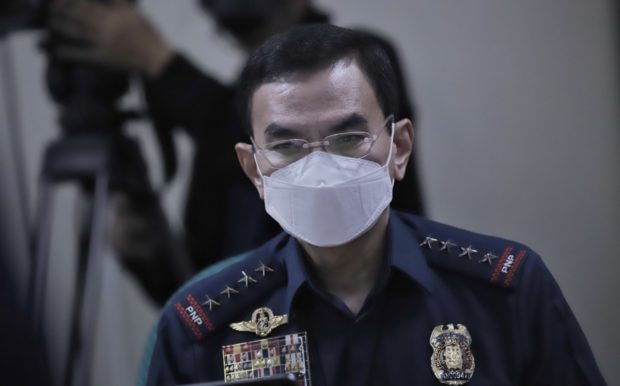ECQ begins: Metro LGUs locked down as separate ‘bubbles’

Philippine National Police (PNP) chief General Guillermo Eleazar. Senate PRIB file photo / Joseph Vidal
The 16 cities and one municipality making up Metro Manila will be treated as separate “bubbles’’ where the police will set up checkpoints to ensure that only authorized persons outside residence (Apors) will be on the streets as the 14-day lockdown begins today.
Gen. Guillermo Eleazar, the Philippine National Police chief, on Thursday said there would be checkpoints at the borders of every local government unit (LGU) in the capital region as part of the movement restrictions during the enhanced community quarantine (ECQ) from Aug. 6 to 20.
But a day before the ECQ was to take effect, some of the rules were still being ironed out. On Thursday evening, presidential spokesperson Harry Roque announced that President Duterte has approved the recommendation of the Inter-Agency Task Force for the Management of Emerging Infectious Diseases to place Laguna, Iloilo City and Cagayan de Oro under ECQ beginning Aug. 6 until Aug. 15.
Placed under modified ECQ, also from Aug. 6 to 15, are Cavite, Lucena City, Rizal and Iloilo province.
Batangas and Quezon, on the other hand, shall be placed under general community quarantine with heightened restrictions for the same period.
Article continues after this advertisement‘Hatid-sundo’
The PNP also on Thursday backtracked on its earlier pronouncement that bringing and fetching Apors to their workplaces would be banned during the ECQ, saying this could be abused by people who just wanted to go out of their homes during the lockdown.
Article continues after this advertisementEleazar withdrew the “no hatid-sundo” policy for Apors following a barrage of criticism.
In addition to the essential workers who were allowed to go out during the previous ECQ, the list has been expanded to include persons serving as drivers of Apors, those going to the vaccination centers to get their shots, workers from the public transportation sector that will be allowed to operate, and fully vaccinated senior citizens going to work or buying basic necessities, Eleazar said.
There will be separate treatments for “worker Apors,” or those who are allowed to go to work physically, and “consumer Apors” or those going out to buy food, medicine and other necessities, he added.
For worker Apors employed in industries that are permitted to fully or partly operate, policemen will be checking, aside from the employee’s ID, the employer’s certification that the worker is part of the skeleton or minimum allowable workforce.
A driver of a worker Apor must also present proof that the worker’s employer has designated the driver to bring the worker to and from work.
Consumer Apors, Eleazar said, would not be allowed to cross city borders to buy food or medicine. They are also banned from going out during curfew hours.
“If you’re from Pasay, you can’t go to Caloocan to buy groceries,” he said.
The only exemptions are those residing along the border and are nearer the groceries, drugstores, banks and other essential facilities of the neighboring city. He said the policemen will be “flexible” on such instances.
No arrests
The policemen have been also instructed to allow passage of “other Apors,” such as those who need to go out of their homes for emergency, medical and humanitarian considerations, and those who are going to get vaccinated.
Eleazar said those found out to be “non-Apors” will not be arrested.
Should there be violators, Eleazar told police officers to practice maximum tolerance.
“We will not hurt or arrest anyone. We will just deny them passage,” the PNP chief said. “Only if they insist on doing their violations will we arrest them and file a complaint against them.”
Eleazar said policemen would also be deployed in vaccination centers to help enforce basic health protocols.
Those found violating health protocols can be apprehended at the checkpoints and penalized according to the applicable local ordinance, he said.
Passes
The PNP chief said the issuance of quarantine passes and monitoring by barangay authorities and private security personnel will also help implement the policy on Apors.
But he admitted that the PNP would not be able to set up checkpoints in all borders between Metro Manila cities and between NCR and neighboring provinces.
“We leave it up to our [local] police stations because we can’t guard all the boundaries, all the roads. But the point is, they will ascertain where best to [set up the checkpoint] in consideration also of the traffic congestion which we want to avoid,” Eleazar said.
Eleazar said the “no hatid-sundo’’ policy on Apors was withdrawn after he discussed it with members of the national pandemic task force.
But based on the new rule, a non-Apor who will be fetching a worker Apor would need to present two documents at the checkpoints: a certificate of employment, indicating the name of the designated non-Apor driver/fetcher of the worker Apor, the make and plate number of the vehicle to be used and the contact number of the employer; and a copy of the business permit of the employer.
Worker Apors who will fetch their fellow worker Apors are not required to present these documents.
50-percent capacity
He noted that unlike previous lockdowns, public transportation would be retained at 50-percent capacity during the ECQ.
Critics of the previous policy pointed out that the Apors would be safer if they will have people to drive them to and from work, rather than risk getting the virus in public transportation.
But the PNP chief defended the pronouncement, saying it “did not just appear out of thin air, or a whimsical decision of our policymakers.”
“If we are not going to strictly implement the quarantine rules, it will certainly defeat the real purpose of the ECQ,” Eleazar said.